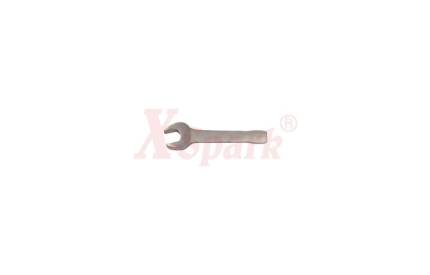Various tools should be cleaned of oil on the surface before use, wipe off the oil and deposits on the surface after use, store them in a dry place, and store them away from corrosive materials. They should be stored with a suitable amount of lubricant for a long time. Percussion tools should not be struck continuously, and there should be appropriate intervals more than ten times. At the same time, the struck part of the tool should be removed in time, and the debris should be continually used. Explosion proof tools in the actual operation should be promptly removed on-site debris and working surface corrosion oxides to prevent third parties from colliding with the explosion.
1. Beryllium copper alloy hand tools are made of high-purity electrolytic copper and precious rare metals. The aluminum bronze explosion-proof tools are made of silver-yellow on the surface. The working surface hardness is above HRC25, and the tensile strength is δb75-85kgf / mm2. It works in the environment of flammable gas ethylene (concentration 7.8%), and it will not produce spark explosion due to impact (friction), friction, and drop hammer. The explosion-proof level is GBExⅡB standard. After the beryllium bronze explosion-proof tool is made into a tool, the surface is golden. The working surface hardness is above HRC35, and the tensile strength is δb105-120kgf / mm2. It operates in the environment of flammable gas hydrogen (concentration: 21%). There will be no spark explosion during impact (collision), friction, and drop hammer. The explosion-proof level is GBExⅡC standard.
2. Various tools should be cleaned of oil on the surface before use. After use, clean the surface of oil and deposits, store them in a dry place, and store them away from corrosive materials. If not used for a long time, they should be coated with an appropriate amount of lubricant.
3. The percussion tools should not be struck continuously, and there should be appropriate intervals more than ten times. At the same time, the struck parts of the tools should be removed in time, and the debris should be continually used. In the actual operation of the knocking and smashing tools, the debris on site and the corroded oxides on the working surface should be removed in time to prevent a third party from colliding and causing an explosion.
4. Do not use wrench tools with excessive force, nor use sleeves or other metal rods to extend the arm, or use a hammer (except for hitting the wrench) to avoid breaking and deformation due to overload, which will affect normal use. When using a tool, its variety and specifications should be reasonably selected according to needs. It should not be replaced by a small one, let alone use it as a steel tool. It should be noted that when using adjustable wrenches, pipe wrenches, and dead wrenches, pay attention to the direction of the force, and do not twist arbitrarily. When using a tool with a blade, first determine the hardness of the workpiece itself. When its hardness is lower than the tool For hardness, it can be operated, and its use is prohibited when its hardness is higher than the hardness of the tool. When the workpiece is tightened by motor, semi-permanently fixed or corroded, and other measures are not taken before using the manual tool, it should be prohibited to avoid damage to the tool.

Striking Open Wrench
Summary of use:
1. Explosion-proof ratchet wrench is used as a striking open wrench or an extension tube, which will cause obvious dents in the handle and the work break. In this case, you should choose a T-shaped sliding head handle plus a sleeve, F-type lever , Curved handle lever or choose a larger ratchet wrench to increase torque!
2. Explosion-proof manual sleeve heads are used on pneumatic tools, which will cause obvious damage, slipping, and obvious cracks on the sleeve wall at the square hole of the sleeve head. When operating in the wind, choose a pneumatic sleeve series.
3. Use the head of the pliers as a hammer, which will cause a dent in the pliers head or the jaws will not bite properly. Please use appropriate explosion-proof copper hammers and other percussion tools when doing percussion work. The use of explosion-proof sharp-nose pliers when bending high-strength wires and sheets will also cause scars at the mouth of the sharp-nose pliers or improper bite of the forceps.
4. Use the explosion-proof flat screwdriver as a small crowbar or flat shovel, chisel, hoe, etc., which may cause the handle to become loose or disconnected or broken from the working end, or it may cause scars or damage to the working end of the screwdriver.
5. Explosion-proof wrenches and pipe pliers are replaced by small ones. The use of sleeves or extension sleeves can cause wrench deformation and fracture, and the wrench handles can be bent, deformed, and broken. Cause deformation of the wrench head and so on.
In daily work, you should choose the appropriate type of explosion-proof tools for different working conditions and environments.
评论
发表评论